#88: Love Walked In by Dinah Washington
City: Ottawa, ON
Radio Station: CKOY
Peak Month: November 1960
Peak Position in Ottawa ~ #1
Peak position in Vancouver ~ #25
Peak Position on Billboard Hot 100 ~ #30
YouTube: “Love Walked In”
Lyrics: “Love Walked In”
Ruth Lee Jones was born in Tuscaloosa, Alabama, in 1924. After her family moved to Chicago, she played piano for the choir in St. Luke’s Baptist Church while still in elementary school. She sang gospel music in church and played piano, directing her church choir in her teens and was a member of the Sallie Martin Gospel Singers. In 1939 when she was fifteen, she won an amateur contest at the Regal Theater in Chicago singing “I Can’t Face the Music”. By 1941–42, she was performing in such Chicago clubs as Dave’s Café and the Downbeat Room of the Sherman Hotel (with Fats Waller). She was playing at the Three Deuces, a jazz club, when a friend took her to hear Billie Holiday at the Garrick Stage Bar. Club owner Joe Sherman was so impressed with her singing of “I Understand”, – a hit that year on the pop chart for Jimmy Dorsey and on the R&B chart for Fats Waller – that he hired her. During her year at the Garrick—she sang upstairs while Holiday performed in the downstairs room—she acquired the name by which she became known. She credited Joe Sherman with suggesting the change from Ruth Jones, made before Lionel Hampton came to hear Dinah at the Garrick. Hampton’s visit brought an offer, and Washington worked as his female band vocalist after she had sung with the band for its opening at the Chicago Regal Theatre.
In 1944, she got a record deal with Keynote Records. Washington had a Top Ten R&B hit with “Evil Gal Blues” which reached #9. A followup, “Salty Papa Blues”, peaked at #10. In 1946, “Blow-Top Blues” climbed to #5 on the R&B chart and #21 on the pop chart. Her sixth Top Ten R&B hit, “Am I Asking Too Much”, became her first chart-topper (October 1948). The following year, “Baby, Get Lost” topped the Billboard R&B chart. Though it stalled at #5, “I Wanna Be Loved” was the number-four R&B single for the year of 1950; While “I Wanna Be Free” (#22 pop and #5 R&B) and “I Only Know” both ranked in the Top 30 R&B songs of 1950. All four of her single releases in 1951 cracked the Top Ten, with “Cold, Cold Heart” ranking at #37 for the year.
Among her four Top Ten hit singles in 1952, Dinah Washington’s cover of “Wheel Of Fortune” was the biggest seller, ranking at #22 at the end of the year. While in 1953, her suggestive “TV is the Thing (this Year)” was ranked at #29 for the year on the R&B chart. The Rock and Roll Hall of Fame listed “TV Is the Thing (This Year)” as one of the songs that shaped rock and roll.
Dinah Washington continued to rack up more Top Ten hits in 1954 with both “I Don’t Hurt Anymore” and “Teach Me Tonight” (which also reached #23 on the pop charts) cracking the Top 30 for the year-end list. In 1955, Washington racked up her thirtieth Top Ten R&B hit with “That’s All I Want From You”.
However, with the advent of rock ‘n roll and doo-wop, starting in 1955 she began to struggle to maintain her chart successes. She rebounded in 1959 with a Top Ten pop and R&B smash hit with “What A Difference a Day Makes”. While “Unforgettable” climbed to #8 on the R&B chart and #17 on the Billboard Hot 100. “What A Difference a Day Makes” earned Washington a Grammy Award for Best Rhythm & Blues Performance. Both became signature songs in her repertoire. “Unforgettable” was inducted into the Grammy Hall of Fame in 2001.
In 1960, Dinah Washington and Brook Benton recorded two duets which both topped the R&B charts: “Baby (You’ve Got What it Takes)” and “A Rockin’ Good Way”. She enjoyed her fifth number-one hit on the R&B charts with “This Bitter Earth”. Later that year she released a recording of “Love Walked In”.
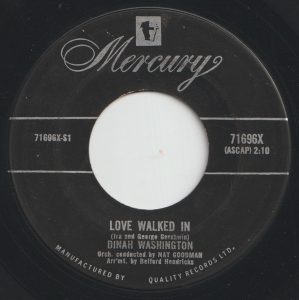
“Love Walked In” was written by George and Ira Gershwin and featured in the 1938 musical The Goldwyn Follies. It was a Top Ten hit in 1938 for both Jan Garber and His Orchestra, and Kenny Barker (whose original version was in the film). Louis Armstrong also had a Top 20 hit in 1938 with the song. In 1953 the Hilltoppers had a #8 pop hit with “Love Walked In”. Other recordings were by Sammy Kaye, Ella Fitzgerald, Bing Crosby (B-side) and The Flamingoes.
Israel “Ira” Gershovitz was born in Manhattan in 1896. He collaborated with his youngest brother, Jacob “George” Gershwine to write some of the most well known traditional pop standards in the first half of the 20th C. While George began composing and “plugging” in Tin Pan Alley from the age of 18, Ira worked as a cashier in his father’s Victorian-style Turkish baths. In 1918, their tune “The Real American Folk Song (is a Rag)” was included in the Broadway musical Ladies First.
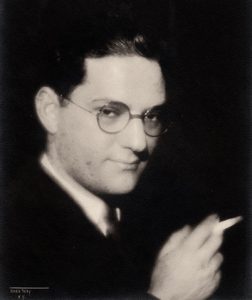
Ira Gershwin (circa 1925)
In the 1920s, George and Ira Gershwin composed “Oh, Lady Be Good!” for the musical Lady Be Good!. It became a #2 hit for Paul Whiteman and his Orchestra in 1925. Another song from the musical, “Fascinating Rhythm”, was a hit for Cliff Edwards. In 1927, “Someone To Watch Over Me” – from the musical Oh Kay! – became a #2 hit for Gertrude Lawrence. “S Wonderful” from Funny Face was a Top Five hit in 1928 for Frank Crumit. While Marion Harris had a big hit that year with “The Man I Love” from Lady Be Good!
It was Red Nichols and His Pennies who had a string of Top Ten hits in 1930 with Gershwin brothers’ tunes. These were “Strike Up The Band”, the theme song from the musical of the same name from 1927; A #2 hit with “Embraceable You” from Girl Crazy, and a Top Five hit with another tune from the same musical titled “I Got Rhythm”. In 1935, several tunes from George and Ira Gershwin’s Porgy and Bess, “I Got Plenty O’ Nuttin'” and “It Ain’t Necessarily So”, were both charting singles for Leo Reisman and His Orchestra. The former climbing to #5 on the American pop charts. While Billie Holiday had a hit in 1936 with the Porgy and Bess song “Summertime”.
In 1937, the Gershwin brothers musical A Damsel in Distress featured “Nice Work if You Can Get It” and “Foggy Day”. The former was a number-one hit for Fred Astaire, who also took “Foggy Day” to #3 that year. As well, Astaire had another number-one hit with “They Can’t Take That Away From Me” from Shall We Dance. Another tune from Shall We Dance, “Let’s Call The Whole Thing Off”, was a #5 hit for Fred Astaire also in 1937.
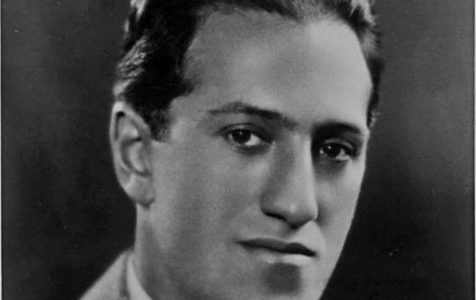
George Gershwin
Early in 1937, Gershwin began to complain of blinding headaches and a recurring impression that he smelled burning rubber. As early as February 1934, he had said he smelled burning garbage at the Detroit railway station, though those with him did not. On February 11, 1937, he performed his Piano Concerto in F in a special concert of his music with the San Francisco Symphony Orchestra. Gershwin, normally a superb pianist in his own compositions, suffered coordination problems and blackouts during the performance. On July 9, 1937, he collapsed and it was learned he had a brain tumor. He died two days later at the age of 38 on July 11th.
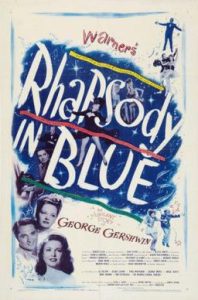
In 1945, there was a biopic about George Gershwin titled Rhapsody in Blue. It earned two Academy Award nominations for a) Scoring of a Musical Picture, and b) Best Sound.
Other notable songs the Gershwin brothers wrote include “But Not For Me” and “I’ve Got A Crush On You”. Ira Gershwin collaborated with Jerome Kern in the 1941 musical Cover Girl tune “Long Ago (and Far Away)”.
In 1932, Ira Gershwin co-wrote the musical Of Thee I Sing. As a result, he was a recipient of the Pulitzer Prize for Drama. Three of his songs, “They Can’t Take That Away from Me” (1937), “Long Ago and Far Away” (1944) – losing out to “Swinging On A Star” – and “The Man That Got Away” (1954 – with Harold Arlen) – which lost out to “Three Coins in the Fountain” – were nominated for an Academy Award for Best Original Song, though none won.
George and Ira Gershwin co-wrote songs for five musical films. George Gershwin separately had a series of his unpublished songs featured in the 1964 musical film Kiss Me, Stupid. George and Ira Gershwin collaborated on eleven Broadway musicals between 1924 and 1933. In 1983, My One and Only was a Broadway musical featuring songs by the Gershwin brothers. A 1992 adaptation of Girl Crazy a was named Crazy For You. It won the 1992 Tony Award (Broadway), the 1993 Olivier Award (London), and the 1994 Dora Award (Toronto) for Best Musical. While a 2012 Broadway musical production titled Nice Work If You Can Get It also showcased Gershwin tunes. It received ten Tony Award nominations and won two for performances in a musical: “Best Featured Actor” and “Best Featured Actress”.
In 2015, a musical based on the 1951 film of the same name – An American in Paris – ran on Broadway from April 2015 to October 2016. It won four Tony Awards, and received a further eight nominations.
“Love Walked In” is a song about a magic moment when someone walked into a space and had a life-changing impact on their future amor. The lyrics tell that “love walked in with you.” As a result a) they drove the shadows away, b) brought the sunniest day, c) and a powerful recognition they’d found “my future at last,” d) forgot the gloom of the past, and e) they found a world completely new. As Dinah Washington might say, “what a difference a day makes.”
“Love Walked In” peaked at #1 in Ottawa, #4 in Portland (OR), and Erie (PA), #5 in Springfield (MA), #6 in Kalamazoo (MI), and #12 in Denver and Duluth (MN).
Other tunes from The Goldwyn Follies include “Love Is Here To Stay”.
Dinah Washington’s last Top 40 pop hit was in 1961 with “September in The Rain”. The single reached #5 on the R&B chart. She was known for her gritty, salty, high-pitched voice, marked by absolute clarity of diction and clipped, bluesy phrasing.
In 1961 Dinah Washington came to Vancouver to appear at The Cave Theatre Restaurant. Red Robinson recalls, “She had the air of a major movie star and loved to flash her expensive jewelry.” Cave owner Ken Stauffer and local DJ legend Red Robinson showed up at Vancouver International Airport to interview her when she arrived.
During her career she appeared in consecutive summers at the Newport Jazz Festival between 1955 and 1959. Other career highlights include the Randalls Island Jazz Festival in New York City (1959), and the International Jazz Festival in Washington, D.C. (1962); As well as frequent gigs at Birdland (1678 Broadway near 52nd Street) between 1958 and 1962, and performances in 1963 with Count Basie and Ella Fitzgerald.
In 1963, the jazz, R&B and pop star released her sixteenth studio album titled Dinah ’63. The Roulette Records liner notes exclaimed:
The Dinah Washington of today…of ’63 is the Dinah Washington who has developed a style and sense of musicianship that has created an ardent following of true believers. The belief is that there is just no other vocalist with the lyrical quality of Miss Washington. It is a belief that is sustained by such recordings as this new album.
…Dinah creates an aura of sheer melodic beauty and swingin’ rhythm as she wraps herself around a superb array of unforgettable standards. These songs may not have been written for Dinah, but she makes each sound as if they were. Dinah’s way with a song is such that it just naturally falls into her groove. When the last note is sounded, the song is now Dinah’s, it can never belong to anyone else.
It is a simple matter to become a true believer, it requires only that you listen to this new album. This is Dinah Washington today…this is Dinah ’63.
Early in the morning of December 14, 1963, Washington’s seventh and last husband, football player Dick “Night Train” Lane, went to sleep with Washington and awoke later to find her slumped over and not responsive. Dr. B.C. Ross pronounced her dead at the scene at age 39. An autopsy later showed a lethal combination of secobarbital and amobarbital, prescriptions for her insomnia and diet, which contributed to her death. The year after her death, Aretha Franklin’s fifth studio album was released: Unforgettable: A Tribute to Dinah Washington.
Tony Bennet commented on Dinah Washington as a singer and performer who’d come to Las Vegas. “She was a good friend of mine, you know. She was great. She used to just come in with two suitcases in Vegas without being booked…And she’d stay as long as she wanted. And all the kids in all the shows on the Strip would come that night. They’d hear that she’s in town and it would be packed just for her performance.”
In 1984, she was inducted into the Big Band and Jazz Hall of Fame, and the Alabama Jazz Hall of Fame in 1986. In 1993, the United States Post Office issued a Dinah Washington 29 cent commemorative postage stamp. In 2005, the Board of Commissioners renamed a park, near where Washington had lived in Chicago in the 1950s, Dinah Washington Park.
In 2008, the city of Tuscaloosa, Alabama, Washington’s birthplace, renamed the section of 30th Avenue between 15th Street and Kaulton Park “Dinah Washington Avenue.” The unveiling ceremony for the new name took place on March 12, 2009, with Washington’s son Robert Grayson and three of her grandchildren in attendance.

On August 29, 2013, the city of Tuscaloosa also dedicated the former Allen Jemison Hardware building, on the northwest corner of Greensboro Avenue and 7th Street (620 Greensboro Avenue), as the newly renovated Dinah Washington Cultural Arts Center. On August 29, 2024, the Dinah Washington Cultural Arts Center opened an exhibit titled “A Centennial Celebration to a Life in Music”. After all, Ruth Lee Jones was born in Tuscaloosa (AL) on August 29, 1924.
September 8, 2025
Ray McGinnis
References:
“Dinah Washington: A Queen in Turmoil: Biography Tells of Singer’s Volatile Life and Unforgettable Music,” NPR, August 29, 2004.
Mark Hughes Cobb, “How a Tuscaloosa native became the Queen of the Blues,” Tuscaloosa News, February 16, 2023.
Mark Hughes Cobb, “Dinah Washington honored with photo exhibit in Tuscaloosa,” Tuscaloosa News, September 13, 2024.
“Dinah Washington Cultural Arts Center,” website.
Red Robinson, “Interview with Dinah Washington, 1961,” SoundCloud.
Jumoké Fashola, “The life, loves and artistry of ‘Queen of the Blues’ Dinah Washington,” everything jazz.
John S. Wilson, “Ira Gershwin, Lyricist, Dies; Songs Embodied Broadway,” New York Times, August 18, 1983.
Rodney Greenberg, “George Gershwin: he forged a new musical language for 20th-century America,” BBC, September 26, 2024.
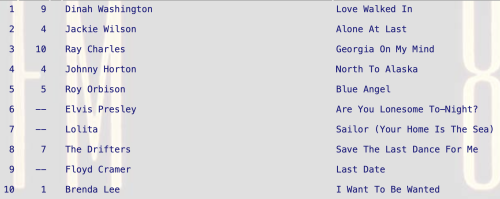
CKOY 1310-AM Ottawa Top Ten | November 19, 1960

Great writeup Ray! Thank you.
You’re welcome Bonnie!